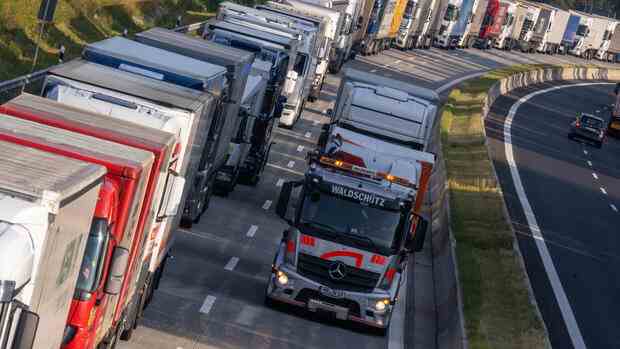The EU is considering phasing out diesel trucks by 2040 or earlier and not recognizing synthetic fuels.
(Photo: dpa)
Berlin In a joint declaration to EU Commission President Ursula von der Leyen, Vice President Frans Timmermans and Transport Commissioner Adina Valean, more than 100 associations and companies in European industry as well as 93 engineers and scientists are calling for the decarbonization of the mobility sector to be promoted in a technology-neutral manner.
Above all, they call for synthetic fuels from renewable energies, so-called e-fuels, to be classified as a contribution to climate protection in order to save carbon dioxide (CO2).
The signatories demand that the regulation of heavy commercial vehicles should “recognize the decarbonization potential of sustainable and renewable fuels”. They include agricultural machinery manufacturers Claas and Krone, mechanical engineering company Liebherr, truck manufacturers such as Deutz and Iveco, and e-fuels providers and gas manufacturers such as Linde.
The letter was triggered by the EU Commission’s latest plans to revise the CO2 regulation for heavy commercial vehicles. In a first draft, there is talk of phasing out diesel trucks as early as 2040 or earlier and not recognizing synthetic fuels.
In contrast to passenger cars, for which the sale of new vehicles with internal combustion engines has already been banned by 2035, battery-powered or hydrogen-powered trucks are still a long way from being offered at anywhere near the same prices as diesel trucks. In addition, the corresponding charging infrastructure is still missing in Germany and other EU countries. The freight forwarders in particular point out that they can only use the most modern technology if it is also economical. Therefore, they promote interim solutions. However, the EU wants to be climate-neutral by 2050.
Transport Minister Wissing continues to fight for e-fuels
In their letter, the signatories point out that heavy goods traffic is important for the functioning of the European internal market. Decarbonization is correspondingly important and with it “all options that can have a quick effect”. From their point of view, these include battery and hydrogen-powered vehicles, but also hybrid variants, synthetic fuels from renewable energies, e-fuels and biofuel.
>> Read here: Car supplier Mahle, company boss in an interview: “We will experience a wave of concentration”
These “can speed up the process” for CO2-free transport, the letter goes on to say. “Including such a provision in the regulation would support the goals of the European Union’s Green Deal and accelerate the decarbonization of the transport sector.”
Federal Transport Minister Volker Wissing (FDP) recently caused confusion when he suggested an end to combustion trucks from 2035. In the meantime he corrected himself. “We fundamentally reject the end of the combustion engine in trucks. There can certainly not be a ban in 2035,” said Wissing of the “Neue Osnabrücker Zeitung”. “Germany wants to be climate-neutral by 2045, and even after that, trucks with synthetic fuels can continue to be operated in a climate-neutral manner,” he clarified.
Wissing has been fighting for months to classify e-fuels as climate-friendly fuels. In the spring there was a scandal within the federal government on this question, which came to a head in the crucial meeting of the EU member states.
It was about the end of combustion engines for cars, which the states agreed to. Accordingly, from 2035 only vehicles that do not emit CO2 may be registered. Since carbon dioxide is always produced during the combustion process, vehicles that burn synthetic fuels also do not fall into this category.
More: Germany’s hydrogen strategy is a long time coming – companies are getting impatient
